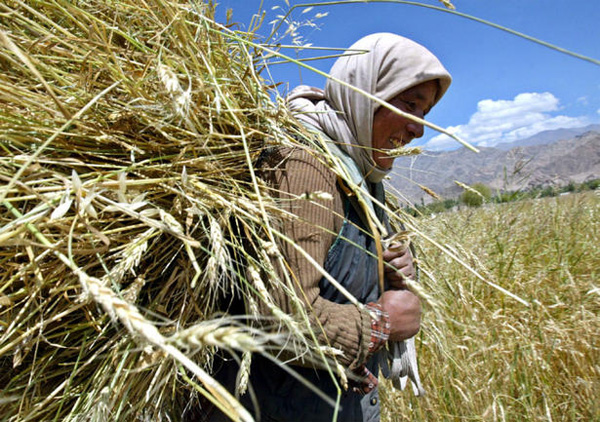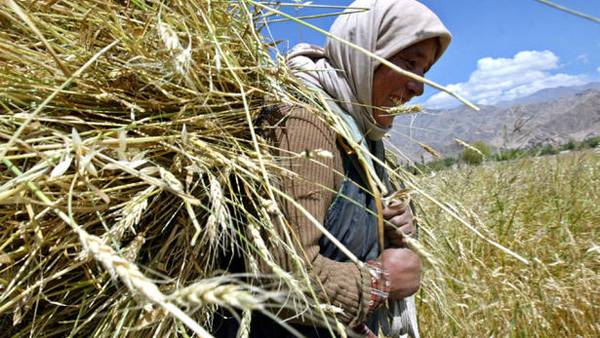Virulent stem rust could wipe out world’s wheat
Source: thestar.com

Scientists are afraid that a virulent strain of stem rust is poised to hit wheat crops in India and Pakistan.
A form of stem rust, known as Ug99, is threatening the world’s wheat crop – with wheat in Uganda, Kenya, Ethiopia, Iran and South Africa already affected.
Scientists fear the virulent strain is on the move and may show up soon in India and Pakistan. Once there it could be blown by the winds to North America, effecting crops in Canada and the United States, scientists suggest.
While wheat farmers here and in the United States have some options when it comes to planting wheat that is resistant to this form of rust, scientists are also trying to genetically breed new lines that are stronger and even more resistant, said Tom Fetch, stem-rust specialist at Agriculture Canada in an interview with the Star.
Ultimately, the long-term effects could be more devastating in the developing world where, unlike here, many farmers can’t afford to use fungicides to battle the rust, Fetch said.
According to Martin Carson, research leader at the USDA Cereal Disease Laboratory at the University of Minnesota, 80 per cent of the world’s wheat is susceptible to Ug99, which was found first in Uganda.
Ug99 is a strain of stem rust that burrows into the tissues of wheat and barley, damaging or killing the plant. The virus saps nutrition from the host plant, he said, absorbing water and putting it under stress. It ends up all shrivelled and shrunken.
Its spread in a field can be rapid. The spores of the fungus germinate and penetrate a plant; in 10 to 14 days, a pustule erupts through the plant and it contains thousands and thousands of spores which can infect more wheat, Carson explained.
Since its discovery in Uganda it has travelled to neighboring countries, wiping out wheat crops, Carson said in an interview with the Star. Now scientists are in “a race against time” to develop new strains that are resistant to the pathogen, he said.
Scientists working at the Durable Rust Resistance in Wheat Project at Cornell University, funded by the Bill and Melinda Gates Foundation, are trying to do just that. But it will likely take between 8 to 10 years to develop a new line and have it ready for planting.
Meanwhile, given wind patterns and where the pathogen has turned up, wheat crops in India and Pakistan may be next hit. But conditions have to be just right for the pathogen to take hold, Carson said.
“It’s a disease where you have to have favourable environmental conditions as well,” he said. “It requires either rainfall or heavy dews for the fungus to penetrate the wheat.” Drought conditions and very high or low temperatures “wouldn’t be particularly favourable.”
If there is a worldwide outbreak affecting the world’s wheat production, it could have some very real “geopolitical repercussions,” including spiking prices for wheat and its products such as bread, Carson said.
He points to 1916 when there was a major outbreak of a kind of stem rust that forced wheat prices to spike at $3 U.S. a bushel then or an equivalent of $60 U.S. a bushel today. It made it very difficult to feed people in Europe after World War 1.
More recently in 2008, when grain prices hit a peak there were food riots throughout North Africa and the Middle East, he said. “In a lot of the world, wheat may be 40 per cent of the caloric daily intake. When you’re living on $2 a day and most of the money goes on food, it doesn’t take much of a rise to spark a riot.
“I think if a lot of people realized how precarious our food supply really is, they might be a little more concerned about some of this stuff.”
With the rust poised to hit India and Pakistan, scientists fear that it won’t be long before it strikes in China. Once there it could blow over to North America on hurricane winds, Fetch explained, and begin to devastate wheat grown in the northern plains of both the U.S. and Canada.
Another more unpredictable fear for scientists is that Ug99 will be brought over to North America on the clothes of someone flying on an airplane from one of the blight-affected regions. The spores are very light and could easily attach themselves to clothing, said Fetch.
The worst thing about this method of transport, he said, is there is no way to predict when or where it might happen.
Source: thestar.com
Look at this video for more: Seed Hunter Ken Street - Collector to the Global Seed Vault AKA Doomsday Vault
Red Ice Radio
Jeffrey Smith - Seeds of Deception & The Danger of Genetically Engineered Foods
Edmund Marriage - Global Catastrophe, Restart of Civilization & The Anu-Nagi (The Shining Ones)
Lucy Wyatt - Approaching Chaos & Saving Civilization






















